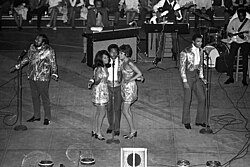
In 1969, Billboard magazine published a chart ranking the top-performing songs in the United States in the easy listening market. The chart, which in 1969 was entitled Easy Listening, has undergone various name changes and has been published since 1996 under the title Adult Contemporary.[1] In 1969, 17 songs topped the chart based on playlists submitted by easy listening radio stations and sales reports submitted by stores.[1]
On the first chart of 1969, Glen Campbell held the top spot with "Wichita Lineman", which was in its fourth week at number one,[2] and remained atop the chart for a further two weeks. Campbell would go on to top the chart with "Galveston" and "Try a Little Kindness", making him the only act to achieve three Easy Listening number ones in 1969. His total of ten weeks in the top spot was also the highest achieved by any act during the year. The only other act with multiple chart-toppers during the year was the 5th Dimension, who reached the top spot with "Medley: Aquarius/Let the Sunshine In (The Flesh Failures)" and "Wedding Bell Blues". The longest unbroken run at number one by a song was eight weeks, achieved by the conductor[3] Henry Mancini's "Love Theme from Romeo and Juliet". Unusually, the number-one song on Billboard's year-end easy listening chart for the year was a track which did not reach number one in the weekly charts: "Hurt So Bad" by the Lettermen.[4][5]
Several of 1969's chart-toppers came from films and stage musicals. These included Mancini's theme from the film Romeo and Juliet,[6] Oliver's song "Jean" from the film The Prime of Miss Jean Brodie,[7] "Raindrops Keep Fallin' on My Head" by B. J. Thomas from the film Butch Cassidy and the Sundance Kid,[8] the 5th Dimension's medley of two songs from the musical Hair,[9] and Sammy Davis Jr.'s version of "I've Gotta Be Me", which placed highly on both the easy listening and pop charts even though the musical in which it originated, Golden Rainbow, was unsuccessful.[10] There was considerable crossover in 1969 between the Easy Listening chart and Billboard's pop chart, the Hot 100. Five songs topped both listings during the year: Mancini's "Love Theme from Romeo and Juliet",[11] both of the 5th Dimension's chart-toppers,[12] "In the Year 2525 (Exordium and Terminus)" by Zager and Evans,[13] and "Leaving on a Jet Plane" by Peter, Paul and Mary.[14] Additionally, the final Easy Listening number one of the year, "Raindrops Keep Fallin' on My Head", went on to top the Hot 100 early in 1970.[14] Although Zager and Evans achieved the feat of topping both listings, the duo proved to be a one-hit wonder and never placed another song on either the pop or easy listening chart.[13][15][16]
- ^ a b Whitburn 2007, p. vi.
- ^ Cite error: The named reference
J4was invoked but never defined (see the help page). - ^ Cassidy, Kenneth M. "Henry Mancini Biography". AllMusic. Retrieved July 23, 2024.
- ^ Whitburn 2002, p. 144.
- ^ "Top Records of 1969", Billboard, p. 17, December 27, 1969
- ^ Breihan, Tom (November 27, 2018). "The Number Ones: Henry Mancini's "Love Theme From Romeo And Juliet"". Stereogum. Archived from the original on January 19, 2019. Retrieved January 18, 2019.
- ^ Hogan, Ed. "Oliver Biography & History". AllMusic. Archived from the original on January 20, 2019. Retrieved January 19, 2019.
- ^ Hayward, Anthony (June 10, 2021). "BJ Thomas: Grammy-winning musician who sang Raindrops Keep Fallin' on My Head". The Independent. Archived from the original on July 16, 2021. Retrieved June 28, 2024.
- ^ Huey, Steve. "The 5th Dimension Biography & History". AllMusic. Archived from the original on January 19, 2019. Retrieved January 18, 2019.
- ^ Fishgall 2010, p. 390.
- ^ Whitburn 2005, p. 437, 990.
- ^ Whitburn 2005, p. 242, 990.
- ^ a b Whitburn 2005, p. 785, 990.
- ^ a b Whitburn 2005, p. 544, 990.
- ^ Whitburn 2002, p. 265.
- ^ Breihan, Tom (November 28, 2018). "The Number Ones: Zager & Evans' "In The Year 2525″". Stereogum. Archived from the original on January 19, 2019. Retrieved January 18, 2019.